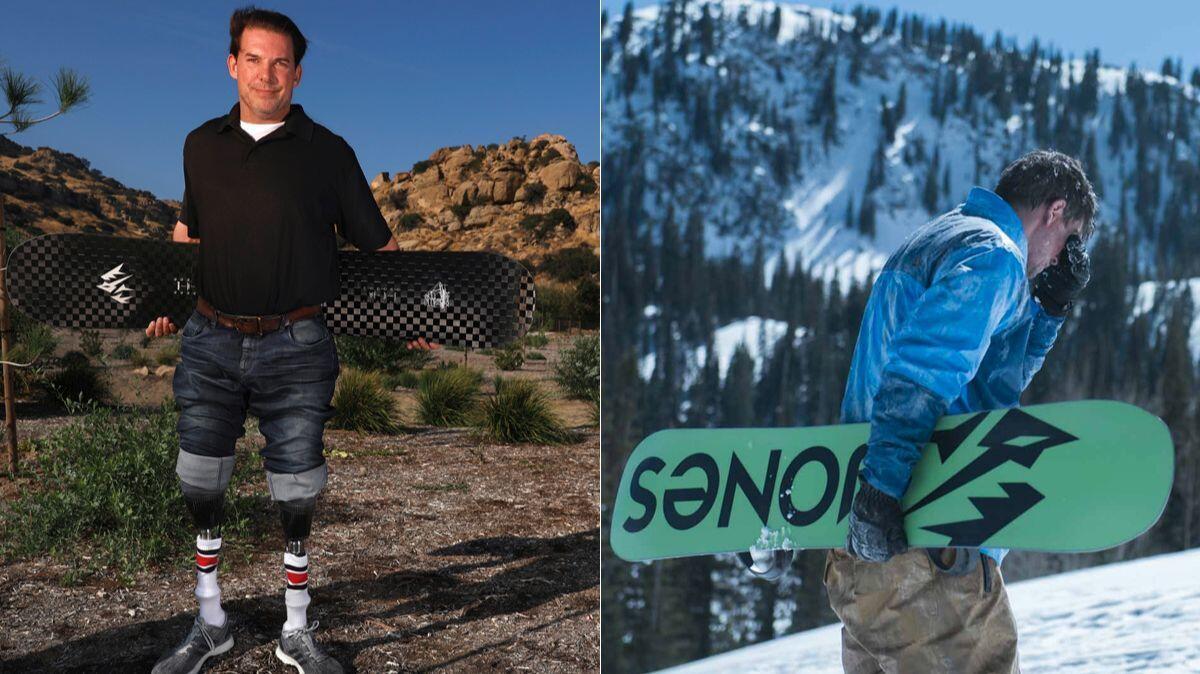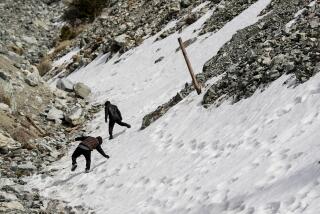Column: Years after surviving Mammoth Mountain ordeal, Eric LeMarque relived it during filming of movie about it

Eric LeMarque has seen his life flash before his eyes more often than most people.
The first time occurred during the eight days he was stranded on Mammoth Mountain in February 2004 after he decided to make a late snowboarding run and got caught in a vicious storm. He landed in unfamiliar territory, armed with only a light jacket, some gum, soggy matches, and a baggie of meth. He ate tree bark and huddled in the shelter he created by digging his board into the snow. The fitness he had built through working out and playing hockey — he represented France in the 1994 Olympics and played in the minor leagues and in Europe — sustained him as he experienced frostbite, dehydration and starvation.
“I saw and met the spirit of death on the mountain, and it was rank and it was very tangible. I saw its presence,” said LeMarque, who was born in Paris but grew up in West Hills and Pacific Palisades.
He again saw his life flash before his eyes during the filming of “6 Below: Miracle on the Mountain,” which depicts the events that cost him his legs but ultimately led him to break his drug addiction and become driven by faith.
As an executive producer of the movie, which opened earlier this month in limited release and is available through video on demand, LeMarque agonized over actor Josh Hartnett’s portrayal of him during key moments of his life. For LeMarque, whose legs were so badly damaged by lengthy exposure to sub-zero temperatures that they were amputated below the knee, watching it all play out again often was overwhelming.
“It was very painful. In fact, I had to walk off set because I immediately started to cry. It felt like they were playing me like an emotional instrument,” said LeMarque, now an inspirational speaker and owner of an IT company. “Then I enjoyed the process of watching the craft of the scene evolve and be terrific. But immediately after the first takes each time that I was on set, it struck me hard and I had to exit.”
One of what he called the “ugly” scenes depicted the first time he used meth “and letting that demon and that spirit into my life.” He had been arrested for trespass and drug possession shortly before that snowboarding trip and was awaiting a court appearance. His decision to quit hockey was also tough to revisit because the sport was so much a part of his identity.
Drawn to the sport as a child, he sailed through youth programs. He was 17 when he began a four-year career at Northern Michigan University, and he was chosen 224th by the Boston Bruins in the 1987 NHL entry draft. Every sport was easy for him. He was arrogant enough to think professional success also would be effortless, but he sabotaged his own chances. In the movie, the Boston coach who orders him off the ice is played by former King Marty McSorley. LeMarque also attended training camp with the Kings but declined an assignment to their minor-league affiliate.
“My vision was to be an NHL Hall of Famer. I skated to the National Hockey League on talent alone. I never worked hard. Not until later,” he said. “Boston sent me a book like this for training camp,” he added, indicating a volume on his dining room table, “and I didn’t even open it. So how audacious was I?”
He played roller hockey for the Los Angeles Blades and played on ice in France and Germany before he came home to take a marketing job with a sporting goods manufacturer. The thrill he had gotten from hockey was replaced by the rush he got from snowboarding and from meth, a habit he picked up while living with a friend. “Even though my life was totally out of bounds and I was addicted to those two powders — the one that fell from the sky and the one that I was sniffing into my body — I was working out at the gym. I was on the snowboard. I was playing hockey. I had vanity still,” he said. “I was this close to feeling sorry for myself and ending up on the street.”

His rescue began a new torment: kicking meth and weaning himself off painkillers. His faith and family sustained him. “I loved when I put the boy to bed and the man in me learned how to reach out and ask for help and find the resources that can help strengthen me,” said LeMarque, who works with Vogue Recovery Centers to help those trying to escape addictions. “Instead of looking at it as a weakness, I felt, wow, the way up is down first.”
The movie feels protracted but LeMarque said the pacing was meant to convey the length of his ordeal. The film ends with him speaking to a kids’ hockey team as they eye his prosthetic legs. His wife, Hope, 19-year-old stepson Nick, and 10-year-old son Zach have known him only that way. “They probably grew up thinking all daddies crawl because sometimes I take off my legs and crawl to the restroom and they used to ride me,” he said. “They’re tremendous and encouraging.”
While still in the hospital he vowed to return to the mountain. He did, one year later. He snowboards occasionally but is no longer obsessed about being first or fastest, and he never lost his love for hockey. “It’s been a blessing in my life. It kept me alive on the mountain,” he said. “It also has taken me around the world and it’s taught me persistence and it’s taught me how to fail forward, and it’s taught me to be a successful person in life.”
Follow Helene Elliott on Twitter @helenenothelen
More to Read
Go beyond the scoreboard
Get the latest on L.A.'s teams in the daily Sports Report newsletter.
You may occasionally receive promotional content from the Los Angeles Times.







